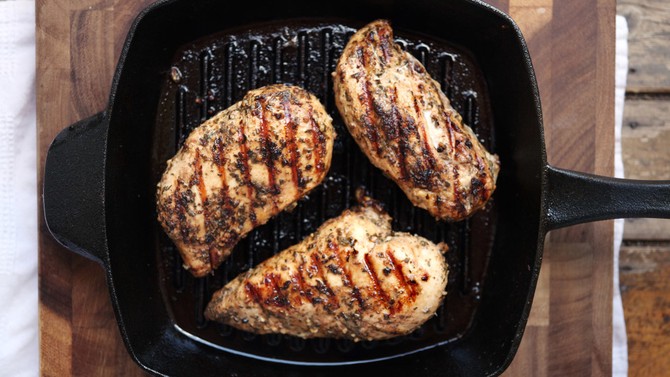6 Vitamins and Minerals You May Not Be Getting Enough Of
Read this before you make your next shopping list.
By Emma Haak McKinley

Photo: Shestock/Getty Images
Vitamin D
Why you might be low: If you live in a northern climate or you're a diligent sunscreen user (and, ahem, we should all fall into that category), you're at risk for a vitamin D deficiency. (Your skin produces vitamin D when it's exposed to sunlight, but not when sunscreen is blocking the UV rays.) In fact, "the number one vitamin that patients I see are low in is vitamin D," says Holly Thacker, MD, director of the Center for Specialized Women's Health at the Cleveland Clinic.
Why you need it: Your body needs vitamin D to absorb calcium, so not getting enough could lead to weak bones. There's also research suggesting that adequate intake could help prevent certain cancers and may play a protective role against chronic illnesses like high blood pressure, heart disease and diabetes. Plus, some studies suggest a link between low vitamin D and depression.
Where to find it: Fish like swordfish, salmon and tuna are excellent sources, as are dairy products including yogurt, cheese and milk (especially if it's fortified with Vitamin D, as many milks are). Eggs are also a good source—just make sure you're not relying on egg white omelets for your intake, since vitamin D is found in the yolks.

Photo: monkeybusinessimages/iStock
B12
Why you might be low: B12 is found primarily in animal products, so if you're a vegan or vegetarian, you may not be getting enough. But diet isn't the only cause of low B12. Proton pump inhibitors, or PPIs, used to treat heartburn, are associated with inadequate levels of this B vitamin, says Caren Behar, MD, a clinical associate professor of medicine at NYU Langone's Joan H. Tisch Center for Women's Health. "It's become a common cause of low B12."
Why you need it: It's essential for good neurological function and red blood cell formation (the cells that carry oxygen around your body). That's why, if you're low, you can feel lethargic and mentally foggy.
Where to find it: The seafood aisle is a great place to start, since haddock, salmon, tuna and trout are high in B12. Milk, yogurt and cheese are also good sources. If you're vegan, many breakfast cereals are fortified with 100 percent of your daily recommended B12—just keep an eye on how much sugar they're packing too.

Photo: Arx0nt/Getty Images
Calcium
Why you might be low: Don't eat a lot of dairy, or on one of the latest dairy-free diets (hey there, Whole30!)? If you're not actively adding other sources of calcium to your diet, it's possible that you're not getting enough.
Why you need it: You know calcium is essential for strong bones and teeth (that's where 99 percent of the calcium in your body goes, after all), but your body also needs it for vascular and muscular function.
Where to find it: Four servings of dairy a day is plenty (that's 8 ounces of milk or yogurt or one ounce of hard cheese), says Behar. But, of course, if you're not on the dairy train at the moment, try dark leafy greens like kale and turnip greens, or broccoli. Tofu made with calcium sulfate is also a good option.

Photo: sf_foodphoto/Getty Images
Iron
Why you might be low: Your period, pregnancy and breastfeeding can all contribute to low iron levels, and if you end up depleted after a pregnancy and don't get your levels back up, the problem can become worse, says Behar.
Why you need it: Iron helps make up the protein that carries oxygen from your lungs to the rest of your body, which is why being mentally and physically tired is one of the main symptoms of low iron.
Where to find it: Meat sources like beef and chicken are your best bet, since the type of iron found in meat (called heme iron) is more bioavailable, or better absorbed, by our bodies than the type we get from plants, says Thacker. But you can also get significant amounts of iron from legumes and lentils.

Photo: milan2099/iStock
Vitamin C
Why you might be low: This one's dietary. According to the latest U.S. Dietary Guidelines for Americans, vitamin C is one the key nutrients that many Americans' diets are lacking, probably because the very best sources are fruits and vegetables.
Why you need it: Vitamin C helps your body absorb iron, and it's also critical for healing wounds and repairing any damaged tissues in your body, including your bones, teeth and cartilage.
Where to find it: In the produce aisle. Top sources of vitamin C include citrus fruits, peppers, cruciferous veggies like broccoli, cauliflower and Brussels sprouts, strawberries and kiwis.

Photo: PeopleImages/iStock
Vitamin A
Why you might be low: This is also a case of poor diet. Vitamin A is on the list of nutrients missing from many American diets, according to the U.S. Dietary Guidelines, and like vitamin C, the reason is likely that it's found primarily in colorful produce.
Why you need it: Let's start with your eyes. Vitamin A is critical for sight, since it helps make up a protein that allows your retinal receptors to absorb light. Without enough of it, you can experience night blindness, or an inability to see in low or no light. Vitamin A also helps your vital organs function normally by assisting in cell growth.
Where to find it: "If you eat things that are orange or yellow, you can easily get enough," says Thacker, so try adding more sweet potatoes, carrots, mangoes, cantaloupes and peppers to your shopping cart.
Published 05/25/2018

